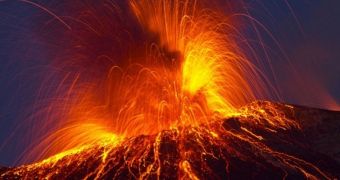According to a new study whose findings have recently been published in the journal Geology, the first known mass extinction in the history of the planet was the result of devastating volcanic eruptions that occurred in present-day Australia 510 million years ago.
In a paper on the matter at hand, Professor Fred Jourdan with the Curtin University in Australia explains that, as shown by previous investigations, this extinction caused some 50% of species to fall off the biodiversity map.
Besides, evidence uncovered over the years indicates that this mass extinction was due to changes both in the planet's climate, and in the make-up of oceans. However, it took a while for science to pin down what caused these changes.
“It has been well-documented that this extinction, which eradicated 50 per cent of species, was related to climatic changes and depletion of oxygen in the oceans, but the exact mechanism causing these changes was not known, until now,” the Curtin University Professor explains.
It is now believed that the environmental shifts that caused this mass extinction 510 million years ago were brought about by eruptions in the Kalkarindji volcanic province, Professor Fred Jourdan explains.
Specifically, these volcanic eruptions in Australia are believed to have released massive amounts of sulphur dioxide, methane, carbon dioxide, and other compounds that not only toyed with the planet's climate, but also altered the oceans' chemistry.
When faced with these new environmental conditions, many species failed to adapt and eventually fell off the biodiversity map, Fred Jourdan and his colleagues argue.
What's more, the Curtin University specialist has reasons to believe that the other mass extinctions that have until now been documented in the history of our planet were also the result of intense volcanic activity.
“We calculated a near perfect chronological correlation between large volcanic province eruptions, climate shifts and mass extinctions over the history of life during the last 550 million years, with only one chance over 20 billion that this correlation is just a coincidence,” Fred Jourdan stresses.
To help put things into perspective, the Curtin University specialist explains that, following the eruption of the small volcano Pinatubo back in 1991, sulphur dioxide emissions that lingered on in the environment caused a lasting drop of a few tenths of degree in average global temperatures.
“If relatively small eruptions like Pinatubo can affect the climate just imagine what a volcanic province with an area equivalent to the size of the state of Western Australia can do,” Fred Jourdan says.

 14 DAY TRIAL //
14 DAY TRIAL //